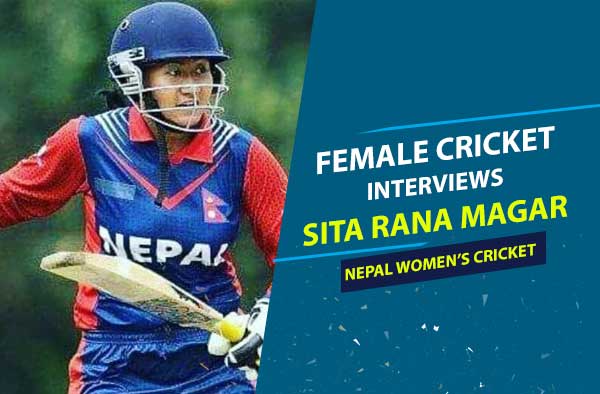Where women’s cricket is slowly moving towards the much deserved recognition and appreciation in the world, there are still some parts in the globe that lack the finishing touch of professionalism in women’s cricket. The Country of Nepal, prone to natural calamities like earthquakes and a wavering board of cricket fighting with the suspension from the ICC, and trying to establish women’s cricket as a profession with minimised loopholes.

Sita Rana Magar, the batting all-rounder of Nepal women’s cricket team who started off her cricket in her school to getting into the national team of Nepal talks about her journey, the cricket in Nepal and what all is affecting the team from reaching the high notes of professionalism in an EXCLUSIVE Interview with Team Female Cricket.
Excerpts from the Interview here:
1. Take us through you childhood and initial cricketing days? What age did you start playing cricket?
I used to play all the sports in my school, when women’s cricket was first introduced in Nepal; I was just 13 years old. My teacher encouraged me to take up cricket and train for the same at the time I was a 7th grader.
2. Have you always been a sports fanatic and how did cricket happen? Did you play any other sport growing up?
Yes, I am a complete sports fanatic. I was always involved in some or the other sport in my school days and so my teachers asked me to take up cricket as well and have a hand on it. Football has always been my game I believe and so I always dreamt of becoming a footballer.
3. When and how did you get into the national cricket team? Which year did you make your debut?
My debut in the national team came in the year 2007. I started off playing cricket in my school days for the school team when I got selected for the regional team- Nepal Jung and then I also participated in Nepal’s first ever women’s cricket tournament where I emerged as the best bowler and eventually got selected for the national team.
4. How was cricket back then in Nepal when you started playing it? Has it evolved over the years?
When I started playing, it was a huge challenge. There were not any training centres, there was a lot of social pressure and there were rarely any girls who wished to take up cricket. But today, I can say that it is slowly evolving.
5. What is the structure or pathway for any aspiring cricketer to play for the national team in Nepal?
The structure goes like getting into the district team first and then the regional. Once they have played enough games and emerge as deserving players, they go on to get selected in the national team.
6. What all facilities are lacking in the Management?
There are a lot of issues and lack of facilities for women’s cricket here in Nepal. The biggest issue is the lack of domestic tournaments arranged for us. It does not give us ample opportunity to express ourselves and then when the international games come up, there is only one month’s training camp arranged for us. Even about coaching, we do not have fixed coaches. With changing tournaments, our coaches also change.
7. Why don’t we have a strong management in the Nepal Cricket board?
The structure of the management board is really wavering and that causes weak management. ICC has suspended the Cricket Association of Nepal (CAN) and nobody is bothering to solve that issue. I believe the management will always be weak without a proper cricket association.
8. There have been some serious issues regarding contracts and pay scales for players, what do you think is the main reason behind that?
The men’s team is growing with every coming tournament and their level of game is also improving which has given them a proper pay scale and official contracts. Maybe, our level of game is somewhere lacking and we are still not able to achieve enough and have not in the past 8 years or so and that is why we have a trouble getting official contracts.
9. Nepal in its certain parts is prone to natural calamities like earthquakes, how does that affect the team and the tournaments they’re to play?
Basically, cricket is played in the Terai region of Nepal. The last time there was an earthquake, it affected the hilly regions and the capital city of Nepal, Kathmandu. Therefore cricket was not affected.
Aarti Bidari – inspirational cricket journey of Rising Cricket for Women, Nepal
10. Do we have sufficient cricket academies in Nepal? Where do most of the girls train in Nepal?
I am residing in Kathmandu since the year 2008 so I know only about the academies that are here in Kathmandu. Here, girls enrol with the Kathmandu Cricket Training Center (KCTC) and Baluwatar Cricket Academy (BCA)
11. What do you enjoy more, batting or bowling and why?
Being a batting all-rounder, I have always enjoyed batting more.
12. What is that one thing needed to improve the state of women’s cricket in Nepal?
Proper management is required highly. Only this can improve the state of women’s cricket in Nepal right now.
13. Tell us about your role at APF? How do you manage these roles?
Armed Police Force (APF) is a government organisation which gives priority to all sports where more than five hundred players play various sports. It is our duty to play but at times we are even asked to work for the security of the nation as well.
14. Coaching plays an extremely crucial role. Nepal has been lacking coaching retentions, how does it affect a player mentally?
Yes, coaching certainly plays a very crucial role. We here get hardly a month’s coaching before international tournaments and also are coaches keep changing. These frequent changes of coaches don’t let them understand a player’s game individually and therefore we do not get trained properly within such a short period of time.
15. There have been certain communication issues regarding tournaments, what do you think is the main reason behind that?
The suspension of CAN is the main problem. When the CAN was working, all the regions were informed about tournaments so that players can be ready in time.
Mariko Hill – Captain of Hong Kong women’s cricket team

The 22 Yard stretch that molded me, is what I hold sacred. A cricketer weaving life’s innings into words. A Rohit Sharma Admirer always. I believe writing and cricket aren’t passions, but ways of life, so truly living the dream!